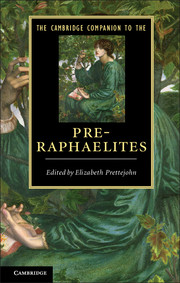Book contents
- Frontmatter
- Introduction
- PART ONE PRE-RAPHAELITISM
- PART TWO PRE-RAPHAELITES
- 6 The poetry of Dante Gabriel Rossetti (1828–1882)
- 7 The painting of Dante Gabriel Rossetti
- 8 William Holman Hunt (1827–1910)
- 9 John Everett Millais (1829–1896)
- 10 Ford Madox Brown (1821–1893)
- 11 Christina Rossetti (1830–1894)
- 12 Elizabeth Eleanor Siddall (1829–1862)
- 13 The writings of William Morris (1834–1896)
- 14 The designs of William Morris
- 15 Edward Burne-Jones (1833–1898)
- 16 Algernon Charles Swinburne (1837–1909)
- 17 William Michael Rossetti (1829–1919)
- 18 Envoi
- Appendix 1 The contents of The Germ
- Appendix 2 The Pre-Raphaelite ‘list of Immortals’
- Guide to further reading and looking
- Cambridge Companions to …
- Index
13 - The writings of William Morris (1834–1896)
from PART TWO - PRE-RAPHAELITES
Published online by Cambridge University Press: 28 September 2012
- Frontmatter
- Introduction
- PART ONE PRE-RAPHAELITISM
- PART TWO PRE-RAPHAELITES
- 6 The poetry of Dante Gabriel Rossetti (1828–1882)
- 7 The painting of Dante Gabriel Rossetti
- 8 William Holman Hunt (1827–1910)
- 9 John Everett Millais (1829–1896)
- 10 Ford Madox Brown (1821–1893)
- 11 Christina Rossetti (1830–1894)
- 12 Elizabeth Eleanor Siddall (1829–1862)
- 13 The writings of William Morris (1834–1896)
- 14 The designs of William Morris
- 15 Edward Burne-Jones (1833–1898)
- 16 Algernon Charles Swinburne (1837–1909)
- 17 William Michael Rossetti (1829–1919)
- 18 Envoi
- Appendix 1 The contents of The Germ
- Appendix 2 The Pre-Raphaelite ‘list of Immortals’
- Guide to further reading and looking
- Cambridge Companions to …
- Index
Summary
The most important thing to remember and the easiest to forget when considering William Morris's varied writings is that all of his writing, like all of his other multifarious work, is part of a radical project: that is, the renovation of art for contemporary and future purposes. This project ultimately encompasses an even broader renovation of society as a whole along politically revolutionary lines – when I say ‘radical’ I mean primarily that Morris aims to reconsider matters from the ground up, inquiring into root causes and essential functions, but he is radical in this other sense, too, that is, socialist, in the end essentially Marxist, an advocate of revolutionary overthrow of the current economic and political order. This renovation of art and its relation to that broader project is explicitly the subject of the lectures and essays he produced in the last twenty years of his life, and is a central concern in his socialist utopian romance of that period, News from Nowhere (1890). But at the same time, in the last decade of his life he was also writing a series of extended prose romances typically referred to as ‘quasi-medieval’, which, especially in the case of the later ones like The Well at the World's End (1896) or The Water of the Wondrous Isles (1897, published posthumously), would seem as far from having a revolutionary thought in their heads as they could possibly be – and these works too are ultimately part of that same project.
- Type
- Chapter
- Information
- The Cambridge Companion to the Pre-Raphaelites , pp. 196 - 210Publisher: Cambridge University PressPrint publication year: 2012
- 1
- Cited by



